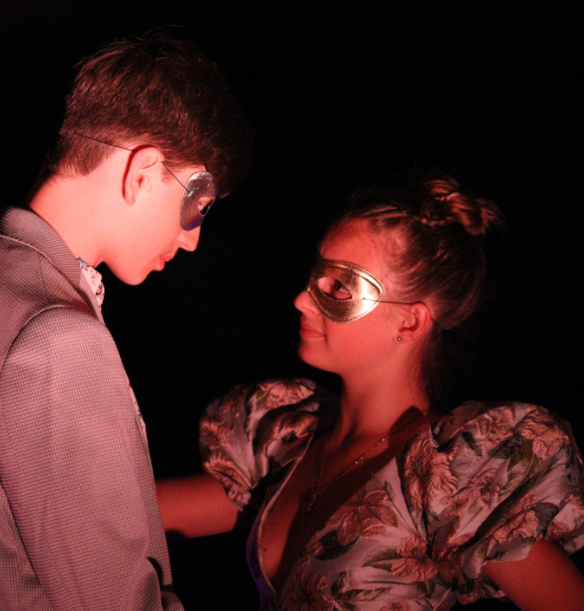
‘The Norman Mailer Anecdote’ // Queensland Theatre
‘The Norman Mailer Anecdote’ was disconcerting.
Big Scary Animal returns to the Brisbane stage with a debut production of Anthony Mullins’ The Norman Mailer Anecdote. Mullins began developing this play with Queensland Theatre when he became a finalist for the 2022-23 Queensland Premier’s Drama Award. In 2024, Big Scary Animal brings Mullins’ work to life in an emotionally charged production as part of Queensland Theatre’s new Door 3 program.
The Norman Mailer Anecdote centres around a sexual assault accusation that tests a family’s values and loyalty. Big Scary Animal promises that the play will be a legal drama that scrutinises our public fascination with high-profile assault cases through the lives of an upper-middle-class family. At first glance, the family appears to be a tight-knit, supportive team comfortably involved in one another’s lives. Helen (Zoë Houghton) is a fiery yet apprehensive lawyer looking to make equity partner at her firm; her husband Marshall (Christopher Sommers) is a seemingly gentle yet charismatic novelist, and their rambunctious yet perturbed daughter Samantha (Hattie Clegg-Robinson) has promise and subsidised university studies on the horizon. This seemingly optimistic, playful and ‘normal’ middle-class Brisbane family is thrown into cataclysm when, in a single night, two precarious scandals threaten to undo their suburban normality and expose their history of questionable choices and potential violations.
After their daughter goes out for a night of drinking with her friends, Marshall shares with Helen that an ex-partner from his youth has accused him of a historical sexual assault. While Helen attempts to prepare for police interviews and court proceedings, Marshall desperately strives to retrieve any evidence of his innocence. As the two plan for the ramifications and argue their way through Marshall’s faded memories, the couple confronts multiple unsettling truths about criminal law, double standards, and the life-altering impacts of sexual violence.
With a sexual assault accusation revealed relatively early in Mullins’ script, one could expect that these characters, and indeed this story, are headed towards emotional turmoil and deeply confronting conversations. However, once Mullins ventures beyond fact-based discussions of ethical nightmares and courthouse processes, each character’s seemingly detailed stances and complex history of experiences are demeaned by sensationalised poetic language. What could have been a more grounded and confronting conversation about trauma and Australia’s ineffectual legal systems is lost when Mullins repeatedly sensationalises his depictions of fear, guilt, and desperation. However, when the writing is realistic and forthright, Houghton, Sommers, and Clegg-Robinson’s skilled performances radiate. Despite the objectionable moments of unrealistic symbolism, all three performers demonstrate layered emotional depth and a skilful control of the family’s simmering conflicts. Mullins’ concept was filled with potential for harrowing dissections of what can be, and for many people, is a violent, life-altering traumatic experience. However, despite the initial frank discussions between Helen and Marshall, the characters’ dialogue stumbles from realistic, unrestrained conflict to lofty adages and flowery imagery. Like an emotional build that peaks too early and fizzles out too soon, Mullins opts for monologues loaded with poetic imagery and cliched character flaws over honest and brazen confrontation between a conflicted family.
Big Scary Animal seems to do their best to embrace Mullins’ topical yet problematic text. For the most part, Julian Curtis’ direction harnesses the energies and chemistry between the characters to deliver a sharp, fast-evolving build of tension throughout the production. With Mullins’ grandiloquent language and Morgan Francis’ cinematic sound design, however, it is interesting that the Big Scary Animal’s set, lighting and production design strives to commit to realism. If Director Curtis had guided the design team to venture into more cohesively heightened territory during the characters’ melodramatic and poetic deviations, then Mullins’ choice to detach from blunt honesty could have been more wholeheartedly embraced. However, it is debatable whether a dreamlike, sensationalised viewpoint in these moments was Mullins’ intention, let alone appropriate for such a serious topic. As it stands, the production’s realism and melodrama elements clash, and the knotty moments of poetic embellishment detract from the production team’s dexterity. Director Julian Curtis and the Big Scary Animal team’s efforts are commendable. They tackle the play’s confronting subject matter head-on with a claustrophobic set, nuanced performances, and a charging pace. Unfortunately, Mullins’ embellished language choices subvert harrowing experiences and frank conversations, leaving this The Norman Mailer Anecdote lacking originality and rigour.
‘The Norman Mailer Anecdote’ performs until Saturday, 18 May 2024 at Queensland Theatre. For more information visit their website.







Responses